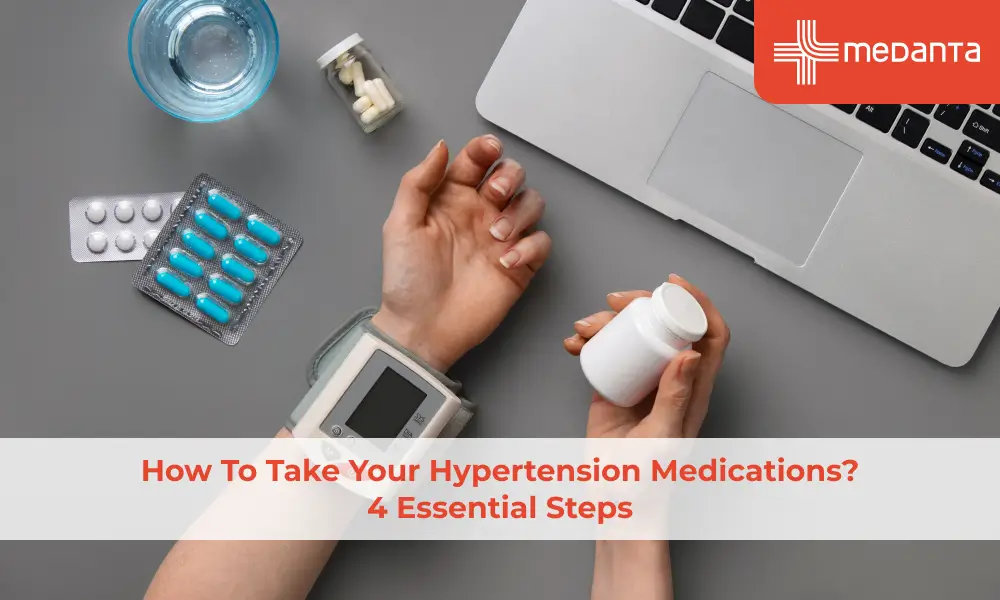How To Take Your Hypertension Medications? 4 Essential Steps

If you have been diagnosed with hypertension it means that your heart is working harder to cope with the kind of elevated pressure exerted by blood that is pumping through it. This could lead to significant strain on your blood vessels and other organs, putting you at a higher risk of a heart attack, kidney problems, or stroke. While your age, genetics, race, and even stressful living and health conditions are factors that may increase your risk of high blood pressure, the good news is that this is a preventive disease.
To begin with, proactive lifestyle changes such as adequate exercise, dietary changes, cutting down on smoking and alcohol intake, and getting sufficient sleep can go a long way in controlling and maintaining blood pressure. These measures, in combination with prescribed medication, can effectively minimise hypertension in patients and in some cases, also reverse it.
Here are 5 five things to keep in mind when taking your hypertension drugs:
Know the effects of your medication
There are many drugs that fight the effects of high blood pressure and each of these have specific side effects. It is a good practice to stay informed about the medication suitable for you as recommended by your doctor. Don't be afraid, for example, to ask your doctor about the brand name as well as the generic name of your drug, its dosage, and for how long it has to be continued.
More importantly, inquire about the side effects and the possible interference with other medication or alcoholic beverages. Also, feel free to ask if the prescribed medication will affect your daily routine and activities such as driving or handling heavy equipment.
Make a habit of taking the drugs on time
If you are prone to forgetting relevant things on account of your age or recovery from a recent illness or operation, it can be overwhelming to keep mental notes about the different hypertension drugs you need to take every day. But this can be easily overcome if you make it part of your everyday routine. Here are some tips that may be useful towards this step:
Associate your daily rituals (such as brushing your teeth, or tea/coffee time, etc) with taking your medicines at regular, fixed times.
Mark your chart (see step#1) with the date you have started your medication so you can measure the drug's progress, and discuss this with your doctor so he/she can assess if it is working for you.
Use apps on your mobile phone or tablet to set reminders or alarms for taking your medication on time, or post sticky notes on relevant spots such as the calendar, the bathroom mirror or kitchen cabinets that will get your attention.
It helps if the medication is stored in one place in your house, for example, by the bedside table, or a single kitchen shelf. Pillbox organisers that have separate box-slots for days of the week or times during the day are available at most superstores and local medical shops. These will significantly reduce any confusion with regards to your drugs and when you need to take them.
Seek help from your family and friends in setting reminders for you.
Better organisation equals less stressful situations
Now that you have a handy list of your medication in place and are better organised with your pillboxes and/or effective reminders, you will notice other benefits that will actually reduce your stress or anxiety levels. For example:
You can take your hypertension drugs at a fixed time every day.
You are in a better position to anticipate when you may run out of your medication and mark your calendar at least a week in advance so you can refill the prescription accordingly.
You are well-equipped even if you are planning to travel away from home. If your journey involves travel by air, it may be a good idea to keep your medication and the doctor's prescription handy at all times with you and not in the checked-in luggage.
Keep your doctor informed about your health and blood pressure
If possible, monitor your blood pressure regularly. Your doctor will be able to help you better if he or she is kept updated about the changes in your blood pressure and other work-related or personal situations that may affect your health. This information will enable your doctor to prescribe or change your medication according to what works best for you. You also need to update your doctor about:
Any other drugs or alternative medicines (such as Ayurvedic herbs, for example) that you need to take for other medical conditions.
Issues concerned with the consumption of alcohol.
Changes in your job, for example, if your work entails a sedentary lifestyle or requires constant travel.
Hypertension need not be a lifelong condition if treated with care. Taking your blood pressure medication on time, a healthy balance of diet and exercise to ensure an appropriate body weight, and sufficient sleep – all these factors can help in lowering the strain on your heart and blood vessels.






